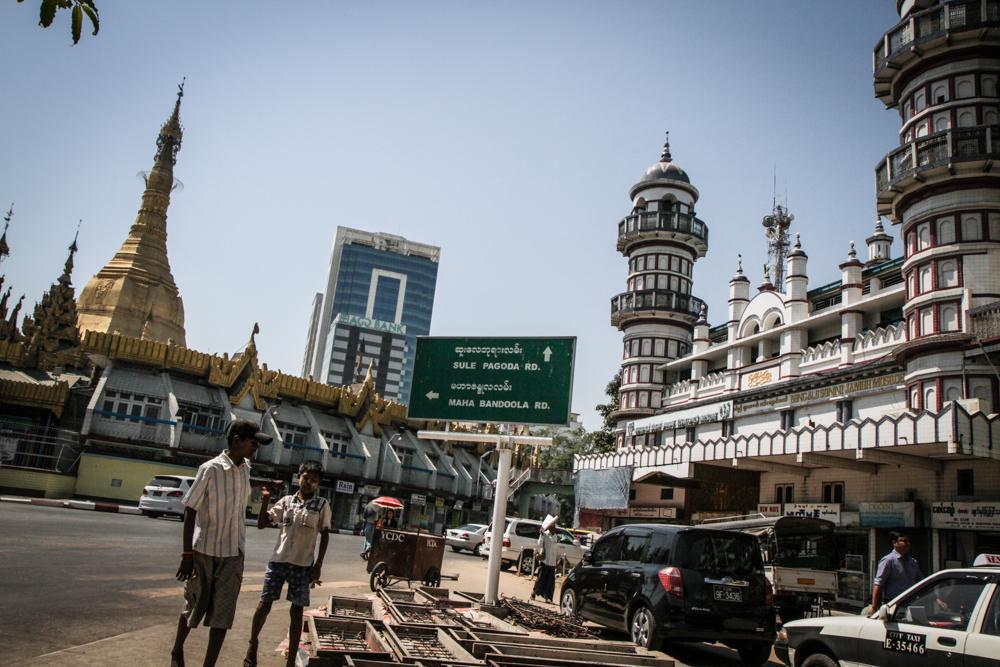With historic elections approaching, the people of Yangon ponder their fate
In Yangon, the Sule Pagoda and Bengali Sunni Jameh Mosque sit on opposite sides of the street.
In the heart of downtown Yangon — formerly known as Rangoon — the 2,500 year-old Sule Pagoda buzzes with the chants of monks and worshippers. Over the years, this iconic Buddhist structure has been a major attraction for both the pious and the political in Myanmar, serving as a rallying point for what was then called Burma’s 1988 student uprisings and again for the 2007 Saffron Revolution.
This country’s incredible diversity of cultures, backgrounds, religions and ethnicities are crushed together in the rapidly developing city. Yet many of its residents share the experience of decades of oppressive isolationism and military rule.
Meandering through gridlocked traffic below the Sule Pagoda, Muslims filter past their Buddhist countrymen and cross the street to the Bengali Sunni Jameh Mosque, just in time for sunset prayer. Down a small alley by the mosque is Mg Mg Nyunt’s electronics store. In a small, air-conditioned office at the back of his shop, he considers how the political landscape is changing.
“I haven’t seen any real democracy in my lifetime. But everybody wants to see something new, and they are eager to have democracy. We even have a common saying now whenever we go to a funeral, we feel sad for the person because they never had a chance to see democracy,” he says.
Nyunt has followed international affairs since childhood, and he’s now keen to analyze politics a little closer to home. And yet, even with his excitement, he’s quick to temper his positivity.
“I’m really not too optimistic, even though Aung San Suu Kyi’s party will win the election. I think these transitional problems will continue for decades,” he says.
A few blocks to the east of Sule Pagoda, Than Than Naing busies herself at her food stall, quickly loading plates with hot food and shouting orders to her family. For her, the politics of elections come second to surviving and the practical realities of making a living.
“The reason I’m not interested in the elections is we are running a business, so we can’t keep politics in mind too much. I have to care about myself, I have to struggle myself, whichever government comes in. I hope that something will change. It would be much better if the country had justice and rules of law. Everybody is struggling and I want everybody to be alright,” she says.
Just around the corner from her food stand sits a small newspaper shop. Inside, a worried Kyaw Wanna Soe seems overwhelmed with the myriad issues affecting the people of Myanmar.
“There are a lot of problems right now. The problems between the students and the government and the different types of people. There are problems here and there and it never gets solved. If one problem is solved, another pops up,” he says.
With his floors a mosaic of newspapers and his walls plastered with posters of Aung San Suu Kyi, Soe feels torn between a desire for a stability that won’t threaten his livelihood, and a desire for a National League for Democracy (NLD) victory and positive change.
“I’m worried about whether the demonstrators will cooperate, or if the elections will be canceled, because I witnessed the Saffron Revolution and when that happened I had to stop my business for some time. If something like the 1988 demonstration happens again, I truly worry what the future of my business will be,” he says.
Another part of his anxiety lies in the constitutional ruling that bars Aung San Suu Kyi from becoming president. For him, this is a sure sign that true change is not coming anytime soon.
“Everybody wants change, everybody hopes there will be change. But I have to say that the change that everyone hopes for is not really happening so far,” he says.
For many, Aung San Suu Kyi is the personification of change. And yet for others, her worrying silence on more recent human rights matters, such as the plight of the Rohingyas, Myanmar's persecuted Muslim population, is concerning.
David Mathieson can see why people would feel this way. He’s an Australian in his 50s who’s been travelling to the country for 20 years and now works as the main researcher for Human Rights Watch. He says many people in the West — and in Myanmar — are oversimplifying the situation she’s in.
“I think the new disappointment with Suu Kyi is a convenient diversion for their own delusions for how complicated the country is,” he says.
Myo Yan Naung Thein, a former political prisoner and research assistant for Suu Kyi's NLD party, agrees that things are more complicated than they appear to be.
“People still recognize her as an ideal, [the] human rights leader of the world, and at the same time they want to see her to be a successful politician. She is trying very hard,” he says.
While the international community and many within Burma place the spotlight solely on Aung San Suu Kyi, for the ordinary people of Myanmar the priorities are simple: A chance to enforce positive changes for others like them. Reforms have been a start, but with the elections just around the corner, too many feel there is too much at stake where too little is guaranteed.
The World is an independent newsroom. We’re not funded by billionaires; instead, we rely on readers and listeners like you. As a listener, you’re a crucial part of our team and our global community. Your support is vital to running our nonprofit newsroom, and we can’t do this work without you. Will you support The World with a gift today? Donations made between now and Dec. 31 will be matched 1:1. Thanks for investing in our work!
